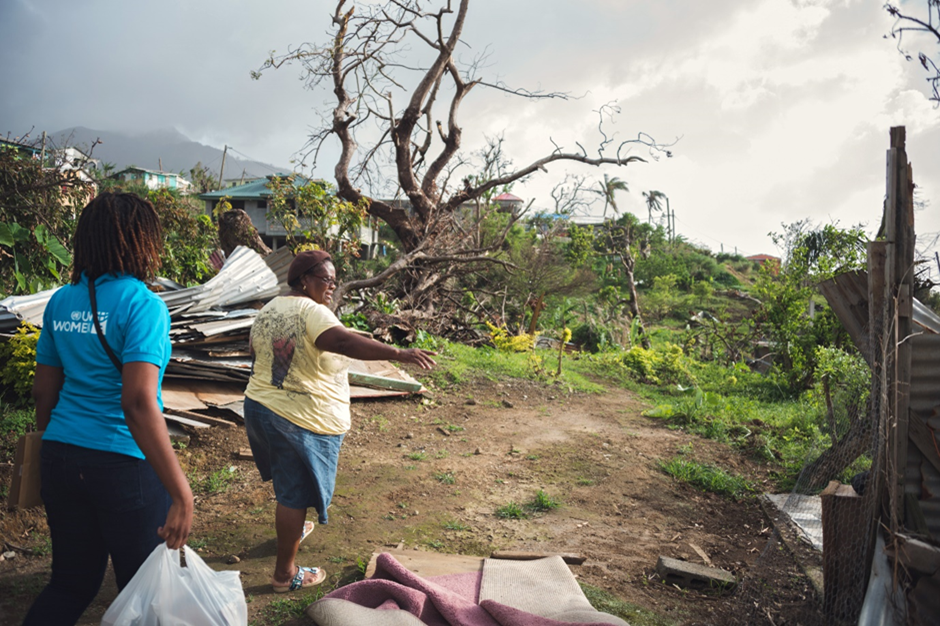Disasters Affect Us All, Differently
Date:

When we talk about climate change and disaster risk resilience, especially in relation to the catastrophic hurricanes and flooding in the Caribbean in recent years, we are sometimes asked – why do we have to break this down to women and men? Aren’t we all affected when there is an adverse event? Don’t we all feel the impact of the COVID-19 pandemic? Is it not the responsibility of state agencies and development organisations to help everyone who is affected?
The answer to all these questions is yes, but to be efficient in our preparedness and response, we must recognise that women and men are impacted differently by climate change. That’s why we need to acknowledge what makes us different, recognising that these differences shape inequality and at times, our own biases.
Global and regional data demonstrate that women are more at risk from climate change impacts than men. This is not because women are naturally more susceptible to natural hazards, resulting disasters or health crises. Instead, it is the stubborn structural barriers to equality based on harmful gender stereotypes and inequality of power in decision making that increase women’s vulnerability, reducing their opportunities to build resiliency.
Evidence of women’s increased vulnerability is in the pre-existing social and cultural demands on women and girls as primary caregivers with the imbalanced responsibilities for care of the elderly, children and the sick. This care work increases in the immediate aftermath of a disaster and continues long after.
There is the high number of single female-headed households in the Caribbean with multiple dependents, and the fact that women are losing livelihoods faster because they are more exposed in informal and lower paying jobs in tourism, fishing, agriculture and other economic sectors worst hit by natural hazards - whether those are health-related like COVID-19 or environmental like hurricanes and flooding, there is insufficient attention to ensuring that women who are now unable to earn an income and meet their needs and those of their families, can return to work and have their livelihoods restored after a disaster.
The recent hurricanes, tropical storms, volcanic eruption and the ongoing COVID-19 pandemic have demonstrated that our social protection systems - measures to cushion the impact on the poorest and most vulnerable - are not shock-responsive. They do not address the life cycle of shocks and risks to prevent people from remaining in or lapsing back into poverty.
Tragically, we see an increase in the incidence of gender-based violence (GBV) against women and girls in the aftermath of events where there is a disruption to infrastructure and basic services, affecting women’s security and the security response; the stressors of the resulting job losses, increased poverty and economic dependence, and the contraction in resources for GBV victim support.
The Convention for the Elimination of all forms of Discrimination Against Women (CEDAW) General recommendation 37 notes that: “The categorisation of women and girls as passive ‘vulnerable groups’ in need of protection from the impact of disasters is a negative gender stereotype that fails to recognise the important contributions to disaster risk reduction, post-disaster management and climate change mitigation and adaptation strategies that women are already making”.
Even though women are stewards for land and coastal resources in their communities, and are long-standing advocates for responsible climate action, women are often left out of decision-making. A leading regional Disaster Risk Management and Gender Equality Expert has stressed that women have to be trained in all aspects of climate change adaptation and mitigation and disaster risk reduction and included in the decision making for the roadmaps to recovery across the region. Leaving women and women’s needs out of the design of policies and programmes means that the “recovery roadmap” will not be complete, effective nor sustainable. Yet the evidence is there of the successful outcomes and management of the COVID-19 crisis by women leaders.
At the national level, the UN Women Women’s Resilience to Disasters Policy Tracker shows that only 54 countries include gender commitments in their disaster risk reduction policies, laws, and plans, including 12 of the 52 small island developing states.
Resilient communities, countries and a Caribbean sub-region will also result from advancing sustainable projects both in the private and public sector including our management and use of energy. We must equally value and harness the talents and leadership of women and girls, building on the work of the women who are breaking historic ground in this field. Equal resources need to be made available to women who work in the fisheries and agriculture sectors to build out their enterprises and to make them more resilient, allowing them to better face, ride out and move on from disasters. Finally, as we look ahead to this year’s observance of International Women’s Day under the theme: “Gender equality today for a sustainable tomorrow”, sustainable financing must be committed for women’s businesses, organisations and indeed all ventures that work towards realising gender equality.